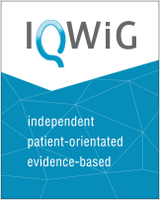Depression in children and adolescents: Does psychotherapy lead to better results when compared with other therapies?1
The aims of this investigation are to
- assess the benefit of psychotherapy (behavioural therapy, psychodynamic psychotherapy [depth psychology-based therapy, analytical psychotherapy], interpersonal psychotherapy) in comparison with active monitoring, antidepressant treatment, treatment with other non-drug interventions (e.g. relaxation exercises), or no treatment (e.g. waiting list) in children and adolescents with depression with regard to patient-relevant outcomes,
- determine (intervention) costs arising in psychotherapy in comparison with active monitoring, antidepressant treatment, treatment with other non-drug interventions (e.g. relaxation exercises), or no treatment (e.g. waiting list) in children and adolescents with depression,
- assess the cost effectiveness of psychotherapy in comparison with active monitoring, antidepressant treatment, treatment with other non-drug interventions (e.g. relaxation exercises), or no treatment (e.g. waiting list) in children and adolescents with depression as well as
- review ethical, social, legal, and organizational aspects associated with the medical intervention.
Keywords:
Psychotherapy, Depressive Disorder, Child, Adolescent, Benefit Assessment, Systematic Review, Technology Assessment – BiomedicalPublishing details
Publisher
Institute for Quality and Efficiency in Health Care (IQWiG)
Topic
Depression in children and adolescents: Does psychotherapy lead to better results when compared with other therapies?
HTA No.
HT19-04
Date of project start
7 January 2020
Address of publisher
Authors
- Barbara Nußbaumer-Streit, Danube University Krems, Department for Evidence-based Medicine and Evaluation, Cochrane Austria, Krems, Austria
- Christina Kien, Danube University Krems, Department for Evidence-based Medicine and Evaluation, Krems, Austria
- Viktoria Titscher, Danube University Krems, Department for Evidence-based Medicine and Evaluation, Krems, Austria
- Andreea Dobrescu, Danube University Krems, Department for Evidence-based Medicine and Evaluation, Krems, Austria
- Birgit Teufer, Danube University Krems, Department for Evidence-based Medicine and Evaluation, Krems, Austria
- Thomas Probst, Danube University Krems, Department for Psychotherapy and Biopsychosocial Health, Krems, Austria
- Christoph Strohmaier, HTA Austria – Austrian Institute for Health Technology Assessment GmbH, Vienna, Austria
- Michal Stanak, HTA Austria – Austrian Institute for Health Technology Assessment GmbH, Vienna, Austria
- Ingrid Zechmeister-Koss, HTA Austria – Austrian Institute for Health Technology Assessment GmbH, Vienna, Austria
- Stephan Kallab, lawyer, St. Pölten, Austria
Clinical advisor
- Ursula Kogelbauer-Leichtfried, University Hospital Tulln, Clinical Department of Child and Adolescent Psychiatry and Psychotherapy, Tulln, Austria
Reviewer
- Anna Glechner, Danube University Krems, Department for Evidence-based Medicine and Evaluation, Krems, Austria
IQWiG coordinated the project, conducted the literature search for the domains “Benefit assessment“ and “Health economic evaluation”, and prepared “HTA kompakt” the easily understandable short version.
According to §139b (3) No. 2 of Social Code Book (SGB) V, Statutory Health Insurance, external experts who are involved in the Institute’s research commissions must disclose “all connections to interest groups and contract organizations, particularly in the pharmaceutical and medical devices industries, including details on the type and amount of any remuneration received”. The Institute received the completed Form for disclosure of potential conflicts of interest from each external expert. The information provided was reviewed by a Committee of the Institute specifically established to assess conflicts of interests. The information on conflicts of interest provided by the external experts and external reviewers is presented in Chapter A12 of the full report. No conflicts of interest were detected that could endanger professional independence with regard to the work on the present commission.
- 1
Translation of Chapters 1 to 9 of the HTA report HT19-04 Depressionen bei Kindern und Jugendlichen: Führt Psychotherapie im Vergleich zu anderen Therapien zu besseren Ergebnissen? (Version 1.0; Status: 14 January 2022 [German original], 12 August 2022 [English translation]). Please note: This document was translated by an external translator and is provided as a service by IQWiG to English-language readers.
